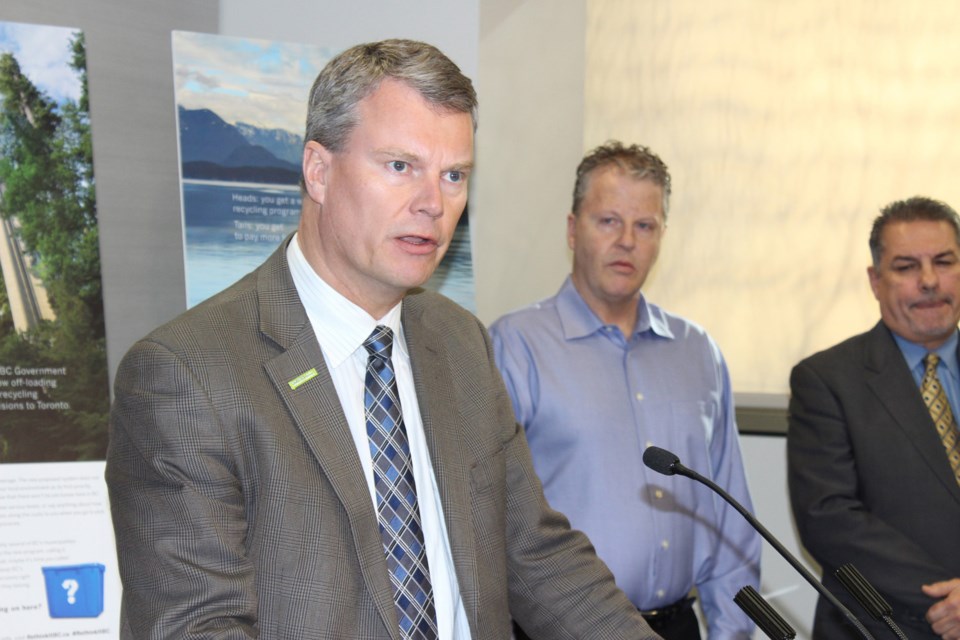A coalition of B.C. businesses says consumers will pay big bucks if the provincial government goes ahead with new recycling regulations on May 19.
And they’re asking Environment Minister Mary Polak and Premier Christy Clark to hit the pause button and rethink the contentious recycling rules they say will kill jobs and increase red tape.
“It’s better to hit the pause button and rethink this rather than being stuck with a bad law on May 19,” said Mike Klassen, B.C. director of provincial affairs for the Canadian Federation of Independent Business (CFIB).
Nine major business associations representing tens of thousands of B.C. small businesses and their employees have formed a coalition and launched a campaign to protest regulatory changes involving the recycling of printed-paper and packaging. The Rethink It, B.C.! campaign is launching a media and social media blitz with ads running in 130 newspapers across the province.
The new regulations shift the responsibility for paying for recycling packaging and other paper products from consumers to the products’ producers. Multi-Materials B.C. (MMBC), an Ontario-based industry group that includes grocery giant Loblaws, mega-retailer Wal-Mart and the Tim Hortons fast food empire, runs the new program, scheduled to launch May 19.
Klassen said the rule changes will hurt thousands of businesses who will have to pass the recycling costs on to their customers. The Rethink It, BC! Coalition includes businesses in the agriculture, newspaper publishing, landscaping, printing and custom manufacturing, retail, wholesale, food and waste collection sectors.
The coalition also includes the B.C. and Yukon Community Newspapers Association (BCYCNA). The Record and its partner newspapers in the Glacier Media chain are members of the BCYCNA.
Canadian Newspaper Association chair Peter Kvarnstrom (also president of B.C. operations for Glacier Media Group) said handing B.C.’s recycling programs over to an organization run out of Toronto makes no sense.
“B.C. is the first jurisdiction in the world where the government has abdicated its responsibility and handed the whole recycling system over to a group of multi-national organizations run from Bay Street,” said Kvarnstrom. “Decisions on B.C.’s recycling programs are being made in offices in Toronto, and local businesses have not been consulted.”
Ken Plumb of Enterprise Paper in Coquitlam says the new recycling regime could boost a family’s grocery bill by up to 20 per cent.
“If your grocery bill is $200, you’ll be paying $240,” said Plumb. “That’s a big increase, especially if you’re a low-income person – and people don’t even know it’s about to happen.”
Plumb’s company distributes packaging and other materials to bakeries, grocery stores and other firms in New Westminster, the Tri-Cities and the rest of B.C. He said the red tape already being generated by the new rules has forced him to hire two new employees just to fill out all the reports.
And Klassen said the new regulations will force businesses to raise the price of everything from pop to pizza.
“If you’re a pizza franchise and you’re in New Westminster, this will cost you between $400 and $500 a week,” said Klassen. “That will have to be passed on to the consumer or the business will have to cut costs somewhere else.”
Like most B.C. municipalities, New Westminster signed on to the MMBC program last year. But with the May 19 implementation date just weeks away, the city still has no idea where its recyclables will be going to for processing.
“We don’t know who our processor is, and we won’t know until mid-April,” said Kristian Davis, solid waste and recycling branch supervisor for the City of New Westminster. “We still don’t know, and it’s getting kind of close.”
Davis said there’s a possibility that the recyclables will have to be shipped to the North Shore, which would increase fuel costs and might even mean hiring more drivers.
Davis said New Westminster has one of the best recycling programs in B.C. and signing on with MMBC has presented a lot of challenges.
“It’s not been an easy process, and I don’t think anyone is happy,” Davis said. “I’m not happy, but we’ll make the most of it.”
Davis said the city does have an option to get out of the contract with MMBC if the new system proves unworkable.
“We have an out, and we will exercise our option to get out if it’s not working,” Davis said.
Ministry of Environment spokesperson David Crebo said the intent behind the MMBC program shifts the cost of recycling from taxpayers to the companies who produce the packaging and other materials. It should provide incentives to industry to reduce packaging.



